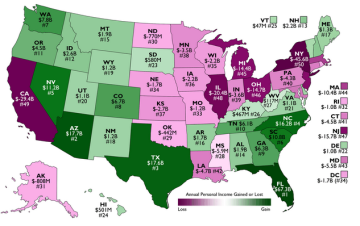Rhode Island Lost $1 Billion in Personal Income from 2000 to 2010
Monday, August 26, 2013
While a recent report by the Rhode Island Division of Planning showed that the state is expected to experience a slight growth in population by 2040, data compiled by the Tax Foundation showed that between 2000 and 2010, Rhode Island lost $1 billion in personal income due to interstate migration -- which is the result of workers moving elsewhere.
On a scale of 1 to 10, "I would rate my concern as an 8," University of Rhode Island Distinguished Professor of Business Administration Dr. Edward Mazze told GoLocal. "We are losing two important population groups -- college graduates with the skills for the jobs needed for the future and the over 50 businessperson and professional. The over 50 group have been the job creators in the past because they owned businesses or professional practices. People are leaving Rhode Island for economic reasons and for the poor "state of the state."
Rhode Island ranked #32 overall for the decline, and represents the "net aggregate adjusted gross income of migrants moving in and out of states between 2000 and 2010. "Figures are in 2010 dollars, and do not include foreign migration, births or deaths," according to to the report.
GET THE LATEST BREAKING NEWS HERE -- SIGN UP FOR GOLOCAL FREE DAILY EBLASTSee which New England states gained -- and lost -- personal income between 2000 and 2010 BELOW.
According to the report, Florida was the big winner with the ebb and flow of workers between states, benefiting to the tune of $67.3 billion in annual income over the ten year period. Arizona was second having seen a gain of $17.7 billion, and Texas just behind at a $17.6 billion boost.
The states that lost the most on the personal income scale due to "interstate migration" were New York, which had drop of $45.6 billion in personal income, followed by California losing $29.4 billion, and Illinois saw $20.4 billion flee its state borders along with workers between 2000 and 2010.
Implications of Population -- and Workforce -- Decline
Former Executive Director of the Rhode Island Public Expenditure Council and fiscal advisor to the Providence City Council, Gary Sasse had the following to say on the finding.
"Rhode Island is getting hit by an "economic double whammy" that could have dire consequence to our future economic well-being. First, the Tax Foundation and others are projecting a significant out migration of personal income. The Tax Foundation reports a over one billion dollars walked out of Rhode Island in the first decade of this century," said Sasse.
Sasse continued, "Second, Rhode Island Statewide Planning Office latest demographic projection released last week show that that our labor force may shrink. This should give Rhode Island decision-makers a clear message that we need more effective and visionary leadership to deal with core issue that being a lack of job opportunities. Abraham Lincoln summarized our situation when he said. "The dogmas of the quiet past are inadequate to the stormy present....so we must think anew and act anew." This past session of the General Assembly focused more on needed structural reforms and less on substantive issues to stop the bleeding such as tax reform."
"So what do we need to consider? There are no magic bullets, but the noted Harvard Professor Michael Porter said we need to focus on productivity/ He noted, "States compete to offer the most productive environment for business. Competitiveness is the productivity with which a state utilizes its human, capital and natural resources." Productivity will help determine Rhode Islands standard of living which will have an obvious impact on keeping income in the state and stemming the out migration of the skilled labor force," said Sasse. "A productivity agenda will require effective leadership in both the private and public sectors."
Mazze touched upon the factors that he saw as contributing to the migration -- and need for them to be addressed by state leaders.
"High unemployment, poor leadership in state government, high personal income and property taxes, high estate tax, unfriendliness to business, little support for education and a state budget process that always smells of cronyism are among the reasons people give for leaving the state," said Mazze. "The 'opportunities are not here' is the perception of many recent college graduates and the over 50 group. And, all of the "feel good" advertising taking place won't change that belief. Until the executive and legislative branches of state government gain the confidence of Rhode Islanders, very little will change and we could lose a seat in Congress."
OSTPA's Lisa Blais gave the migration of personal income out of Rhode Island a "10" on a level of urgency.
"We have been losing population and wealth for some time now and so we should be very concerned - I give it a 10! The telling data lies in what has replaced that lost income," said Blais. "Detractors have referenced this as a myth of the flight of the earls. Regardless of where anyone falls on the political spectrum, it is in the best interest of all taxpayers in our state to attract and retain productive citizens, wealth and business."
"The obvious answer is to hit the restart button by making RI an uber- business friendly state. We should minimize the costs of government employees by becoming more efficient (think lean) and by taking a hard look at the reasons why it certainly appears that it is financially preferable to be a city or state employee! Our unemployment levels are miserable and the governor was recently quoted as saying that we should find an agreeable settlement regarding the pension reform lawsuit that spends a little bit more of taxpayers' money to make the unions happy and we wonder why those that have the means to leave, do?"
Blais continued, "There are a myriad of reasons that people move - for work, for estate tax planning purposes, for a lower cost of living, for a better economic environment, for better public schools - we're long overdue for all of this in RI. Too many elected officials in RI are more concerned with balancing the governments' checkbook rather than with the citizens' ability to balance their own."
Related Articles
- Curtis Parvin: Impersonal Consumerism in a Failing Economy
- Don Roach: President Obama has Failed to Turn Around the Economy
- Executive Office Of Commerce Won’t Help RI Economy—Critics
- Guest MINDSETTERS™ William Walaska & David Bates: Working to Turn the Economy Around
- Guest MINDSETTER™ James Sheehan: RI Needs to Bold in Rebuilding Economy
- Aaron Regunberg: How Walmart Workers Could Save the U.S. Economy
- Is RI’s Economy on the Rebound?
- Block/RI Taxpayers Organization Challenge General Assembly on Economy
- LISTEN: RI Economy on the Rebound?
- CCI Report Shows RI Economy ‘Shifting Into High Gear’





